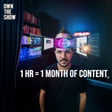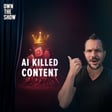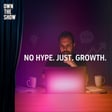Become a Creator today!Start creating today - Share your story with the world!
Start for free
00:00:00
00:00:01

The Future in Focus: AI Tools That Forecast Business Opportunities w/Saar Ben-Attar
In this episode of the AI-Driven Marketer, Danchez is joined by Saar Ben-Attar, founder of Ascent Growth Partners, to explore the transformative impact of AI in strategic planning and future scenario building. They dive into the origins of Saar's unique approach to leveraging AI for predicting business opportunities and threats, and discuss how these advanced tools are reshaping the way companies foresee and navigate the future. Tune in to discover how AI can enhance your strategic foresight and help your business adapt to rapidly changing market conditions.
Episode Timestamps:
- 00:14 - Introduction to Saar Ben-Attar and the collaboration on a custom GPT for scenario planning.
- 00:23 - Saar discusses the inception of his approach to future scenario planning.
- 02:31 - Exploring the universal need for strategic foresight across different cultures and eras.
- 04:01 - The shift from traditional scenario planning to real-time, AI-enhanced methodologies.
- 06:31 - The importance of strategic planning in marketing and its impact on business operations.
- 08:39 - How AI tools facilitate a continuous and adaptive strategic planning process.
- 13:12 - Discussing the creative aspect of using AI in generating future scenarios.
- 17:18 - When Saar realized AI could significantly expedite the scenario planning process.
- 22:18 - The practical implementation of AI in enhancing existing business methodologies.
- 28:33 - The role of marketing and innovation in business as discussed by Peter Drucker.
- 32:47 - The evolving relationship between AI applications and business strategy.
- 38:33 - How pioneering in AI and thought leadership can influence industry standards.
- 41:57 - Future potential of AI in evaluating and sizing market opportunities.
- 46:50 - Closing thoughts and the future of AI in strategic applications.
Transcript
Introduction to AI in Strategic Planning
00:00:05
Speaker
Welcome back to the AI Driven Marketer. I'm Dan Chezz, and today I'm excited to talk about how AI can impact your strategic planning. Yes, so I'm talking to our guest, Sar Benatar, the founder of Ascent Growth Partners, where we're collaborating on this custom GPT we've been working on. Sar, welcome to the show. Thank you. Thank you, Dan. It's great to be here.
00:00:28
Speaker
I know just a few months ago, we were introduced by a mutual friend to work on this collaborative project where we've been building this, I don't know, this scenario planner in a custom GPT in order to kind of predict the future for businesses. They're not predicted, but build scenarios of the future. But before we dive into the tech and how the AI works,
00:00:49
Speaker
I'd love to know a little bit more about where this process even came from for your consultancy.
Origins and Importance of Scenario Planning
00:00:55
Speaker
Where did you start developing in the ability and the service offering that you have in order to help clients see different future scenarios? 100%. A little bit of background on us. We are a growth and innovation consultancy, very much operating with firms in the broader ecosystem.
00:01:16
Speaker
So we like to venture and explore and find the opportunity in the spaces in which firms are trying to venture into, are growing into, are identifying opportunities beyond their current operations. We're based both in South Africa, where I'm calling you in from, as well as in Singapore.
00:01:36
Speaker
In both markets what we found both in Asia Middle East Africa even in North America we have some clients what we do find irrespective of geography.
00:01:46
Speaker
is that the anticipation of the future is something that has been with us as human beings since the early start. You know, sometime back I've written a chapter for a dear friend and a fellow foresight professional. And she asked me to write this chapter about the history of foresight. How do we go and why do we anticipate?
00:02:13
Speaker
And what I found is, irrespective of ancient cultures, Middle Ages, industrial era, now in the post-industrial area and the knowledge economy, we still find that the need for individuals, the needs of teams and organizations to make sense of the future, but knowing that we can't predict the future,
00:02:34
Speaker
is an important consideration now it's not one perhaps one of the earlier conversations it's been given a lot of attention and resources often we find these are small teams either from a strategy background or business transformation background.
00:02:51
Speaker
Or sometimes from the outside, you have kind of joined the organization in whatever form while collaborating with the organization in some form, because there's a business challenge that the organization is struggling to solve. And in order to solve that challenge, we've got to peer into the future. Not for accuracy, not to know for sure that this is the exact reality that will happen, but rather to say, if our current reality evolves into this,
00:03:21
Speaker
How would we thrive under this scenario?
00:03:24
Speaker
because it might just be possible. It's a plausible scenario. Some of the scenarios are even eeringly similar to what our current reality is, but with a twist, with a refinement, with new and additional drivers that come into the mix. And therefore, our ability to respond and to remain resilient and ultimately to thrive in those scenarios is absolutely, absolutely critical.
00:03:53
Speaker
And that's kind of been the context for us. The one big question that we couldn't solve for until we got involved specifically with AI technologies is how do we do this in real time?
Transition to Real-Time Planning
00:04:06
Speaker
In a nice imaginary world or in the world pre-COVID, to a large extent, in many industries, one could develop scenarios, one could develop contingency plans. In your own time, in parallel to how the business operates, we were working within
00:04:23
Speaker
quite clearly laid out parameters, the business cycle, the strategic planning process and what could keep to those and said well that's an interesting point, why don't we keep it to the next cycle, why don't we look at it next when we look at the or refine or update our strategic plan.
00:04:40
Speaker
In today's reality, post-COVID, and generally when we look at the extent to which the environment is changing, every industry we look at, even some of the most traditional and established industries out there, primary energy, infrastructure, basic services, wherever you touch, you can venture way beyond tech.
00:05:05
Speaker
We found that the ability to develop these scenarios, the ability to peer into the future and say, is my business plan still relevant?
AI's Role in Continuous Strategy
00:05:14
Speaker
Do I still thrive if that happens? Because I might be seeing the early signs of it already. What happens if it keeps growing into that? Are we still sound? Is our business plan still sound? Or do we need to make changes today?
00:05:29
Speaker
to be ready for that kind of a future. And similarly, organizations would ask us the question, well, what happens if we venture into this new opportunity area? What does the future hold in that space? It evolves quickly. And therefore, could we make sense of it? And the answer was, only if it's done in real time, only if we could do it in a matter of hours or a number of sessions rather than
00:05:56
Speaker
Well, I need weeks or months at a time, which is the old model by which we used to do scenarios. So the shift from parallel, slow, progressive development of scenarios into multiple real-time scenario development was the real paradigm shift for us. And that's where the conversations with clients, with business partners became very focused around, could we use this to solve this problem?
00:06:23
Speaker
Because that particular problem is hitting us now in our business plan. It's not being realized. We're not getting to the hang of it and we need to do it differently.
00:06:33
Speaker
Well, strategic planning is one of those larger things that is usually handled in the C-suite because it impacts every area of the business. I find as a marketer that I'm pulled into those meetings often if I'm working within a leadership team just because marketers, you know, I mean, market's in the name. It's like the more I can pay attention to the market and predict where the market's going to go, the better I can lead the company because revenue is one of the biggest things a company cares about and operates around, right?
00:06:59
Speaker
So, I know it's a topic that I've been kind of near and dear to my heart because marketers kind of get rewarded for being able to better predict where the market's going to go and adjust accordingly because marketing is a little bit more long range focused than something like sales.
00:07:13
Speaker
So when you were showing me your plan, I've just been learning a ton from even your process and even how to better see the future by taking current trends and then even pitting two trends together to see what possible scenarios we might end up if a particular two different trends, let's say like the rise of AI, you know, goes fast or slows down or if something like
00:07:39
Speaker
It's another trend that might be is kind of unrelated maybe like the the ongoing conflict in the Middle East You know picking up or going down and what for scenarios we might run into that it's It actually paints a better picture of what could be so that you can find the hidden Opportunities and possible threats in the different scenarios Something else you said about making the AI tool more relevant is this the speed?
00:08:04
Speaker
that we need to be doing strategic planning now i've heard it said that like what we were doing for annual strategic planning now needs to be done at a quarterly level in quarterly level down to the monthly level because it's just moving too fast but. I can imagine after learning your process for doing that i'm like yeah that would be problematic at the quarterly level cuz by the time it was done you'd be spending the whole quarter planning and then as soon as it was done you'd be re planning again.
00:08:27
Speaker
Well, Dan, it's such a good point. Ultimately, what we strive for is continuous strategy because strategy is really a cycle that we could ideally we should move very quickly from exploring, diagnosing, assessing, developing solution and testing it in the market very quickly.
00:08:45
Speaker
So it's a continuous process that's a live process. But in order to do that, you need the right tools. And that's where this kind of adaptive and continuous process really comes from. But I'd like to go back to something that you've said and why this conversation is so important for marketers.
00:09:03
Speaker
And that is that those trends that we spoke about, those signals out there in the market are not only affecting your own organization. Yes, we could have a conversation about how the conflict in the Middle East and whether it expands into a fully regional war or even have broader consequences could be impacting your business. That's the one conversation. But how about the conversation about how is it affecting your customers? How is it affecting the end users of your products?
00:09:31
Speaker
And that's where really interesting conversations take place. It doesn't just affect the obvious things that you might think about, such as the propensity to buy, for example, based on the change in price of fuel or the availability of products based on what supply chain changes take place. It affects the propensity to pay, the propensity to take on debt,
00:09:56
Speaker
the propensity to share with others your purchase and to learn together with others in communities based on the level of trust that you have. All of these seemingly unrelated phenomena actually have an impact and that's where scenarios can get really really interesting and that's where I think the power of this for marketers becomes real and very tangible because if you can bring that outside
00:10:23
Speaker
evolving view of the market, not just based on past trends. What is the economic cycle
AI and Consumer Behavior in Marketing
00:10:29
Speaker
like? What will interest rates do, et cetera, et cetera? How will a consumer appetite evolve based on known trends? But if you introduce some of those new trends, if you introduce things that are not all known knowns into a scenario, you can play into scenarios that are very different. One of our conversations, for example, then we spoke about
00:10:52
Speaker
the propensity or the growth in buy now, pay later solutions. It's a great example in a consumer space of exactly what's happening. What's really affecting the buy now, pay later phenomena is not just what we know, which is it's particularly used by millennials. It's the almost the reaction to over indebtedness
00:11:15
Speaker
And in many cases, the insufficient clarity of the regulatory landscape and it evolving only recently to adapt, it's the news things. For example, one of the key trends affecting that particular market opportunity, and I'm very conscious that particular segment is growing in double digits in many countries around the world,
00:11:36
Speaker
is the fact that the propensity of consumers to use or adopt these kinds of solutions, alternative lending solutions, in fact, are very much predicated on the use of AI technologies, on the ability of AI to automate the process, so the decisions around credit provision, around which consumers get offered what,
00:12:00
Speaker
is no longer a human decision. And there's a whole plethora of factors that affect that. Now, when you start to have that conversation, what will the adoption of generative AI, for example, look like two years, three years from now? How would it affect the way that you as a marketer interact with your end users? Oh, by the way, in the context of this particular product,
00:12:24
Speaker
That's when things get really, really interesting. And if you're able to test that in live format, if you're able to test that even on a panel involving actual customers and trade partners, that's when it gets very interesting. And we saw a tremendous speed, the kind of progress that one could make. The old paradigms start to break and you start to introduce some new ones into the mix and are able to test them in real time.
00:12:51
Speaker
What I love about your scenario builder, and this was the process that you had built prior to building or using AI in order to accelerate the process, but it really is painting a picture of the future. It's not like it's using a lot of
00:13:07
Speaker
quantitative analysis, though it is analyzing the scenarios and thinking through what the implications would be, but it's actually a creative process that it's running through in order to paint a picture of what the future might look like. If these two trends continue running strong, what then does it look like in the future in this particular economy? And some of the things that you have on here is like, what does it look like economically?
00:13:31
Speaker
What does it look like technologically socially politically work life financial services it even goes on to say like how did we get here like how do we What could accelerate or slow down this scenario? Uh, what does it look like two years five years ten years down the line all in an attempt?
00:13:48
Speaker
To help paint a picture it's really a story telling device and i love how it's created and imagine that in a good way and helping you. Get outside of your head and what you think the likely scenario is into different scenarios that maybe you hadn't considered and we're maybe blind to because you might be so clouded on what is probably the scenario you think is going to happen.
00:14:09
Speaker
And I just found it to be a very useful tool, even for myself, thinking about where I might be like five, 10 years down to where with future scenarios playing out right now, I've been using it even to plan my own future because it's, it's such a helpful tool and helping me understand what different realities might be.
00:14:26
Speaker
It's such a good point, and I'm glad that you're using it even in your own personal capacity because that's when I know that actually it sticks, that's when I know that it's actually valuable to the person rather than just the organization. I mean, the one thing I think to keep in mind is that, and if I take you kind of back, you know, the use of scenario planning has been around for centuries, but it's been kind of formalized
00:14:52
Speaker
in particular since just before World War II. And after World War II, we started seeing tremendous uptake of scenario planning and the whole science and discipline behind it. And in the US, the RAN Corporation was one of the fundamental drivers behind the use and adoption of scenario planning. And later, organizations like Shell took it much more into a private sector.
00:15:17
Speaker
form. But if I just kind of stop for a moment on the Rand Corporation and the fundamental role that they've played, one of the godfathers of scenario planning kind of put it so nicely, and this is, I mean, I've got to take you back to the 1960s, where he said, very succinctly said, in scenario planning, we've got to imagine the unimaginable. Now think of that for a moment.
00:15:40
Speaker
If we have a tool that allows us to step into a different space so we can imagine the unimaginable, this is unimaginable because of a particular context you're in, because of blind spots that we've developed within our organizations.
00:15:59
Speaker
Because in past years, someone decided that's a no, we don't venture here, or that's not economically feasible. And what technology and what much more nuanced understanding of customers market is now able to tap into.
00:16:15
Speaker
is that it helps to have all of these paradigms tested in some cases replaced by better paradigms. And I think they're, the role of the market is fundamental because if you can bring in the understanding and appreciation for the data with that creative swan,
00:16:34
Speaker
then I think you bring real competitive advantage into the process. Because ultimately, imagining the unimaginable is a creative act. We could talk about what AI could do 10 years from now.
00:16:47
Speaker
But I still think that we are decades away from a machine that will be able to step in as creatively as us. Now, does that mean that generative AI cannot be used? No. I think it could be pretty creative, but it helps us to become more creative. It helps triggering us
00:17:04
Speaker
the thinking that goes beyond the current paradigm that we're locked into and said, what would you do here? And that's where the human being steps in. And that's where I think marketers could play a tremendous role in getting all of us to become more creative in this process.
Historical Comparisons and AI in Scenario Planning
00:17:22
Speaker
What did you realize that AI was going to be the possible solution in order to speed up this process?
00:17:30
Speaker
So I guess there's two answers to that. I guess the sneaking suspicion I had was pretty much the beginning.
00:17:38
Speaker
Because I started seeing AI throwing back to us perspectives that as a human being, I had to take two or three steps to get there. I had to say, well, explain to me how you got to this point. And the good thing about generative AI is that you can exactly pose that question and say, show me the logical steps. How did you get to that scenario? How did you get to that conclusion? How did you get to that narrative?
00:18:02
Speaker
But when it really landed for me was, if you recall, as part of our process, we've added a particular step to it that really crystallized it for me. And that step was what historical comparative, what historical situation is indicative of this scenario of the future.
00:18:24
Speaker
remember the one time i was looking at it we're actually looking at the development of financial services and related digital solutions in an emerging market.
00:18:35
Speaker
And I remember one of the answers that the chat, the generative AI, the custom GPT came back with was Japan and going through its debt crisis and the effect that had on consumers for years to come. And I remember I had to stop myself for a moment and said, how did you get from country X all the way back to Japan? It's like a 10,000 kilometer geographical difference in two and a half decades.
00:19:01
Speaker
going on 3, in fact, that leap is more than just a chance. And that's why I realized that actually the custom GPT in its brute computing force was actually
00:19:15
Speaker
developing and exploring potentialities well into the future. It's very similar, if I take you kind of back, the moment when Deep thought that computer program by IBM beat Garry Kasparov in chess. And you remember there was a moment in that game where Garry Kasparov got very frustrated. And then later in an interview, he explained what happened. He actually realized that however many moves he thought into the future,
00:19:46
Speaker
This custom program was thinking more steps. In fact, in some cases, 15 or more steps into the future. And that got him at a very human level, very frustrated. He suddenly realized that the computer could do things that even he as the grandmaster of chess couldn't do. That's the moment I had with this custom GPT that suddenly, and this is based on chat GPT-4. We haven't even seen chat GPT-5. Well, in a year we're going to have it or less.
00:20:13
Speaker
So even with today's technology, suddenly I realized that the kind of connections that this custom GPT is putting together is well beyond the obvious, is well beyond the anticipated of what I thought was possible, but it was creating those connections that was going way beyond.
00:20:34
Speaker
And that for me is where creativity steps in. That's where the custom GPT becomes helpful for us as professionals to go, well, let's play into that scenario. What could Japan teach us about today's consumers in the market 10,000 kilometers away?
00:20:52
Speaker
Now, I love the way, someone said on the previous episode to this one, I had a guest on that said that chat GPT and custom GPTs in particular is the Excel to the AI generation or to the AI world.
00:21:06
Speaker
Like Excel became a open, an open tool that you could do lots of things with plan vacations, build budgets, forecast the future. Like you could do a lot with Excel. That was a open ended tool that could be used to build MVPs and many other tools. And that's what we're seeing with chat GPT.
Custom GPTs in Existing Models
00:21:24
Speaker
Now, now with custom GPTs, we can actually.
00:21:27
Speaker
wrap a model around it, which is when chat GPT becomes very powerful. If you can give it an existing model or step-by-step process, all of a sudden you're getting AI to honestly act more human because you're training it to take not just because you could just ask it, hey,
00:21:45
Speaker
Here's the business build a scenario that helps me understand the different impacts different these three trends. And it would it would be okay, but the fact that you had a proven process for doing this and how to take baby steps into building it is what makes this thing work really well and I think is the big opportunity with AI.
00:22:03
Speaker
currently is taking proven processes and then injecting AI work is capable of actually filling in the gaps of what humans used to do. But now AI can do it because it's capable of filling in the gaps and thinking through like, okay, if these are the parameters, here's here, I can fill, I can fill in those gaps, which is why I knew when we were talking to the initial stages, I'm like, this is possible, not even with future tech with current tech.
00:22:28
Speaker
It's possible to use and fill in to build out these scenarios in a way that's actually useful i've learned a lot from you the way you interact with it's different because usually the way I interact with it is very Straightforward because I help build the steps that it runs follows But you throw curve balls at it all the time and i'm always like interested to see
00:22:45
Speaker
you're like throwing in extra questions into the process and it the fun thing about ai is it's it's fairly flexible like in the old code world you threw curveballs into it man that's when programs broke but ai it doesn't always it doesn't always hit the ball out of the park but it'll take its best attempt at dealing with extra data that you've just given it or a different direction maybe you're put nudging it into and try to fill in the gap still um and that's where the tool is really really helpful because you can
00:23:15
Speaker
customize the parameters even as it's prompting you with a very specific here give me this and then I'll give you that kind of a
00:23:24
Speaker
I mean, the example of Excel that you give is such a good one because I remember when I kind of first came across, I think it wasn't even Microsoft Excel. It was Lotus Notes and there was another product that not even been used to that. I don't think it survived until the 2000s. But if you think of it, today's Excel is not fundamentally different than the Excel we had in the late 80s, early 90s. The computer power, of course, is much more.
00:23:53
Speaker
Pretty much it's the same thing. You've got a spreadsheet of various cells. You can put formulas in there. You can put text. You can color it. You can format it. You've got macros. You can automate some of it. But the fundamental
00:24:06
Speaker
building blocks or the fundamental use for it is still very similar. That versatility that we first got unleashed onto us in that first generation you speak about is still available to us today. And that for me says that you don't have to go five new generations into the future. You don't have to kind of, I mean, I'm reading Mustafa Suleiman's book now about the future of AI, the waves of AI that are coming at us.
00:24:35
Speaker
And my response to the book, it's a wonderful book, is the head of AI for Microsoft. And it's a great read. We're really a worthwhile read, but I would hate for people to come out of it and think of it as a future shock. Oh my word, we haven't even mastered AI version one now or version two. Now we've got more waves coming. And my answer to it is think of Excel.
00:24:58
Speaker
Yes, there are far more sophisticated tools that one could use to digest, analyze, and use data. And they all have their space. But you still use XM for good reason. There's a lot that that versatility brings in. And I think that's the power that, again, marketers could bring into the use of current level custom GPTs. The fact that computing power is going to
00:25:25
Speaker
grow by multiples in the next few years, that's an added bonus. So now I can throw a 500 page or a 300 page book at custom GPT and it would digest it as quickly as it now digests a 10 page PDF summary or a 30 page annual report.
00:25:44
Speaker
But the underlying functionality is still there. And that kind of brings me into some additional benefits of the tool as I found. And I have to be kind of acknowledged that you haven't asked about my history, but I actually started off in the marketing role.
00:26:02
Speaker
I studied marketing in my university years and fell in love with it and it was one of these things that I saw immediately the link between marketing and strategy. Our marketers and their understanding of the market and of customers can bring insights into strategy that were just
00:26:19
Speaker
It was grasped by chartered accountants and lawyers in those days, that suddenly marketers could bring a flair and a creativity and new insights into the realm of strategy. So that's kind of where I started. That was kind of my first kind of role, and a few others. But if I think of it with that context, it kind of benefits it
00:26:46
Speaker
Tools such as custom GPT, such as this bring, is not just in testing our paradigms, not just getting us to think differently or even become as a secondary benefit, a second benefit more creative in the way we step into scenarios and ask the what-if questions.
00:27:04
Speaker
It also gets us to be more critical. It gets us to be more critical of our understanding of customers, of our understanding of behavior, and of at some point saying, I actually don't know the answer to this, but oh boy, if someone can get us to understand the space, that would be wonderful. We've just hit the jackpot. We just understood what we didn't know that we didn't know.
00:27:30
Speaker
And that's the realm that I think marketers could really thrive in, because we deal with a lot of spaces that are unknown to the organization. And I guess a final benefit of, and it kind of relates to the speed is, now marketers can get involved in the actual commercialization process. It's one thing to sit as the advisor and saying, hey, there's a segment here that's being underserved. There's a behavior of customers that we can actually respond to really well, what are we doing in this space?
00:27:59
Speaker
Now with these kinds of real-time tools, marketers can get steeped into the actual commercialization drive and say, what is that pilot telling us now? Let's take the results and take it back to this Generative AI tool and ask a few more questions. And for me, that has real power in it. Now you're in the engine room of generating new revenues in a way that marketers and certainly
00:28:23
Speaker
in my understanding, in my earlier years of being steeped into marketing before strategy, that was one of the things that I really missed. Yeah. Peter Drucker has one of my favorite quotes on marketing. He says, because the purpose of business is to create a customer, the business enterprise has two and only two basic functions, marketing and innovation.
00:28:47
Speaker
Those are the two things because we're creating customers. And it's funny, I got so obsessed with marketing that I just kept digging a hole deeper and deeper. I found I popped out the other side and I was in a whole different world called entrepreneurship because it was all about discerning markets.
00:29:03
Speaker
And that's where entrepreneurship starts, is discerning a market and then capitalizing on it, right? Which is what you're talking about in the capitalization, where if you go deep enough into marketing, this is the place you end up playing. You start trying to essentially forecast the future, where the market's going, so that you can bring the most economic value to a particular market in order to grow a profit. Hopefully the win-win for everybody, right? And that's the exciting place to really, really play.
00:29:32
Speaker
It's kind of looking at the future and finding out where you can create win-win scenarios for everybody involved. Absolutely.
Engagement with AI Scenario Tools
00:29:40
Speaker
Now that you've had this custom GPT in order to build out scenarios, what is some of the feedback you've seen as you've shown it to others?
00:29:49
Speaker
It's a great question. A couple of things immediately come to mind. I think firstly is interest. The number of people that have come to us and said, I want to be in the next webinar, I want to learn more about this, I want to understand this better, has been amazing, has been absolutely incredible.
00:30:08
Speaker
And remember, our community of CEOs and senior leaders has grown extensively as a result of that because of that interest. So that's the first thing that we've seen. The second thing that we've seen is that people are much more open in talking about their generative AI experience or generally the AI experience. In the past, what I found, there's almost this aura of the fear of missing out.
00:30:36
Speaker
So people would play with chat GPT as an example. I mean, there are many tools out there, but they would play with it almost in their personal capacity on the side without telling their colleagues and therefore couldn't really benchmark
00:30:52
Speaker
how well they were doing, how productive they've been. It was kind of a conversation that you might have next to the water cooler or to the coffee machine or by your next Starbucks experience. But it wouldn't be one that you would have openly in organizations. What I found is since we started using this custom GPT, the conversation, the number of people
00:31:20
Speaker
We stepped out and said, hey, you know what? Last quarter, I've actually used something like that. But I wasn't able to achieve this in our scenario. How do you do this? And for me, that's so wonderful to watch, because now you're actually finding there are many more practitioners of artificial intelligence in organizations. We're just not used to calling them that. They're still the marketer, the operations guy, et cetera, the finance executive.
00:31:48
Speaker
And therefore, the conversation doesn't take place openly. And that's really changing. And that's very heartwarming. I'm still even on my own journey trying to figure out, because I've taken to AI and helping build things like this. But a lot of people haven't. Even some of my tech savvy friends that were comfortable with setting up complex automation sequences and dealing with tech, there's something different about those who gravitate towards building AI. And I'm not sure if it's more engineering minded.
00:32:15
Speaker
That's how I feel about it, but I don't know how other people feel about it. I think that's still emerging, we're still learning what does it take to even get AI to do what you need to do. I do find that engineering makes the most sense because you have specific inputs, you're trying to get a specific output, and then you're trying to figure out not how just to prompt, but it truly is prompt engineering, trying to figure out how to ask the right questions in the right way at the right time, in the right sequence.
00:32:40
Speaker
in order to help guide it through a very human thinking process. But I'm still learning and I think that's part of the fun of the whole thing is that there's still so many unknowns and we all get to explore it and kind of talk about it together as we all learn it. Well, maybe I could just add one more thing to it. And that's the thing that often as marketers we don't talk about. So I'm going to step into the world of finance.
00:33:06
Speaker
Remember the word valuations. So here's an example. We've been working with a client some time back and they were looking to step into a new space. They had to understand the market, they had to understand consumers, they had to understand how they interact. And one of the things that we found out is that as
00:33:22
Speaker
This is the space of the energy transition. And now people need to use digital tools and they need to understand how they produce and consume electricity. And this became a new space for everyone, for consumers, for generators, for utilities, for a lot of intermediaries in between, for tech companies, for digital service providers, for telcos, for providing the connectivity amongst all these role players in this ecosystem.
00:33:48
Speaker
And as we're kind of sketching how big this ecosystem is and how rich it is in potential solutions and needs that are not being served as yet, the one thing that came to our minds is that, in fact, the valuation of these new opportunity spaces is actually much higher in the first few years, especially when the fast followers enter the market.
00:34:16
Speaker
And very often, we tend to look at the value of a market much later in its maturity when the earlier adopters are in. And some of the even the later adopters are in. And you look at the total size, the addressable side of the market and say, that's what the market is worth. And therefore, as a consequence of it, this is what our organization is worth. This is the kind of premium that investors will be willing to attach to our organization.
00:34:41
Speaker
What we found is in new market spaces, in market spaces that are generally disrupted by technology, like is happening along the energy transition in multiple stages, that is actually incorrect. What we found was that a lot of the value gets generated earlier on in the process. And therefore, by being a fast follower, if you're able to capture onto that, even if we're still at your point, still learning, still figuring out what's the most efficient way of getting there,
00:35:09
Speaker
The ones who were active participants in that market were willing to realize not just ultimately the number of active users, but were able to engage in M&A activity, were able to grab onto capabilities earlier on.
00:35:25
Speaker
and commercialize them those with the firms those with the organization that ultimately when you take it over ten or fifteen year period with the most valuable. And i think there's a lesson in that is that it was it doesn't matter which discipline you start with the engineer or the corporate finance person.
Value of Emerging Digital Markets
00:35:45
Speaker
or the mna in the suit or whatever or the strategist that's kind of wondering what the next business model would look like or the market and looking at consumer data you all have an opportunity to participate if you can recognize that the underlying value.
00:36:04
Speaker
is changing because of what now we're able to do with this technology in the shifts of tremendous and if i could use maybe just as a last point just one number and i generally don't like to quote mckenzie but i'm gonna put them on this data study recently where they looked at the integrated network economy they're looking at these new market spaces.
00:36:26
Speaker
where we now need to understand consumers much better and in real time in figuring out the right network, the right ecosystem to serve them. And very often that takes you beyond your immediate organization. You can't do everything yourself. The value they attach to this integrated network economy is over $80 trillion. And they said within the next two or three decades, this is gonna become reality. And we're already seeing signs of this. Again, it goes back to that point of
00:36:56
Speaker
play early, participate, find your own best applications for this and be very real with yourself and your team as to what business problem you're trying to solve because the biggest valuation shifts are happening now and over the next decade. And that's something that even as marketers, not just as finance individuals or CEOs, we need to keep in mind.
00:37:17
Speaker
Find the ones who make the maps also make the rules, right? Exactly. They're the ones who had to cut through the bush, and therefore, they got to cut the path the way they saw fit. And that happens in technology, of course, but it also happens in the realm of thought leadership. If you were the one who minted the terms, then, and popularized it to the point you actually led people with it, and like, no, this is the way that it works, or this is how I've categorized the things. There's other ways to do it, but this is the way I did it.
00:37:46
Speaker
You tend to have written the playbook on how to do it, which is the one everybody else references later, even if they go off on their own. That can happen in a macro sense, like a thought leader across an industry, but it can happen in a micro sense within a company. You could be the first one, maybe others have pioneered it outside and you're just taking their playbook, pioneering it on the inside within even a large company, and you are the go-to person on that topic or for that software or for that new thing, whatever it is.
00:38:13
Speaker
Everybody will go to you because you're the one who's led the way and therefore you get to kind of write the rules within the organization on that particular topic, whether it's AI or not. That's kind of my learning so far, which is why I'm like, well, that's why it's exciting for me and why I'm doing this podcast to interview those who are doing good stuff with AI now and to document a few of my learnings along the way.
00:38:36
Speaker
But i have to ask you're pretty forward thinking on this i haven't seen a lot of businesses like really lean into building custom gpts to really make the most of their their intellectual capital their processes and methodologies. Now that we've had this milestone here creating this custom gpt that build scenarios what are some future things now that you've had a taste of like what can happen here what are you thinking for the future of yourself and for a cent growth partners.
00:39:00
Speaker
That's great. I mean, the one that we're already starting to kind of put the building blocks on. And I think for me, this would be kind of the marriage between the qualitative benefits of generative AI and some of the more quantitative tools.
00:39:17
Speaker
And that is, if we have now reduced the time it took to create scenarios from a couple of weeks to a couple of hours, well beyond a 10x factor, well beyond that, could we do the same with one of the more intricate, difficult, and sometimes frustrating activities that marketers get involved in?
00:39:42
Speaker
And that is finding the opportunity and sizing it. It's one thing to say, I can explore into the future and I can identify an opportunity. But what is that opportunity worth?
00:39:54
Speaker
What is the size of the market, not just what it is now where you have only cursory information very often? What is it likely to be five years from now? And the answer generally today is, well, it depends. It depends how things pan out. But imagine once you've got the scenario sketched, you then ask the next question, which is, I really like this particular opportunity area. I can see us developing an offering in this space.
00:40:18
Speaker
What would be the market worth of that? What would be the size of the market? How do we quantify that over the next five years? And where are the major shifts going to take place? Because that starts to get marketers into the decision making space of investments, of upfront capital allocation. And then we're starting now to play with how generative AI and some other AI tools
00:40:46
Speaker
that are based on collecting information from various databases and conglomerating it together. If we bring those two together, I think we'll have within the next few months a market sizing tool that, again, we'll have that 10X factor that we'll be able to give those answers.
00:41:05
Speaker
And again, those answers are for the conversation. Those are triggering now, marketers say, what could I do with this? If you knew the particular segment could be worth that much, say three years from now, based on the scenario you've now sketched,
00:41:21
Speaker
And that's something it's not seeing in your current business plan, I'll bet you. And if you could say, I've just spotted that, and I could now trace the five, six, seven, tenfold increase in evaluation, how much is that worth? And for me, that gets me excited. Now we can marry the quantitative and the qualitative.
00:41:43
Speaker
That would be exciting. It might be possible. Is it possible to do manually already? Does your firm or other consulting firms have a process of evaluating the potential size of an opportunity? It's just done manually now. 100%. So it's partly manual. So what happens at the moment, and we certainly do this in our firm, is you will generally use manually.
00:42:12
Speaker
partly manually, the customer's data in order to infer what that future market valuation would be. It's generally a cumbersome process. It involves a lot of manual work. It is prone to error. And very often, what gets lost in the process, particularly at the micro level, are those logical links. People will make assumptions, human beings. Unfortunately, we are very good at making assumptions.
00:42:39
Speaker
And as a marketer or as a CEO or any executive, you wouldn't have visibility of those assumptions to the degree that you think you do. You could have visibility into the macro assumptions, but the minute we get into the micro layer,
00:42:52
Speaker
You actually don't know what assumptions people are making when they go, well, I think this market is going to grow by 35% based on this data. And what AI helps us to do is helps us to understand their own creative leaps, even when it comes to something like market sizing or opportunity sizing.
00:43:11
Speaker
And that's why I think, again, machine and humans could play together well and become more creative as a result. So that's the next foray that we're in. It exists now in terms of a process, but it is cumbersome. It's prone to error. It's prone to human bias. And I think we can improve that significantly through this process.
00:43:33
Speaker
Yeah, I mean, if there's a proven process for it already, then chances are AI can do it too. Because that's, at least with the current tech, that's really all we're doing here is we're mapping AI to proven processes. Exactly. And therefore, we can have a reasonable expectation of it being able to do as well, or close to just as well as what a human would do in its ability to ration out the tiny baby steps to see that project all the way through.
00:44:02
Speaker
Dan, it's a great point. We do, but I think we do one more thing with including generative AI at this stage. There'll be other forms of AI that will join us in this process over time, but for now generative AI. And that is that we also not just mimic the human process, I think we enhance it. Because some of these logical and creative links that generative AI helps us to or puts in front of us,
00:44:28
Speaker
helps us to challenge the process itself. And that's where we get to a better process. And I think that's a huge benefit because often we are unaware of both the logical and the commercial gaps in our process. How often do we underestimate opportunities because of that? If I take you obviously to the most obvious one, the famous ones of IBM and their view of personal computing,
00:44:57
Speaker
In the early 1980s, I write to very recent ones. In my book that was published recently, Challenges, I speak about the example of Elon Musk and how he dismissed only a few years ago.
00:45:15
Speaker
BYD as a worthy competitor in the battery electric vehicle space and his rationale for it, full of human biases, was very poor design.
00:45:29
Speaker
The poor designers, therefore, I assume that their ability to creatively overcome challenges in things like the density of batteries or arrive at breakthroughs in battery engineering wouldn't be there. They can't even design a damn car as well as we do.
00:45:46
Speaker
And guess what happened? BYD did exactly the opposite. And I dedicate an entire chapter in my book to the BYD Tesla match. And it's still an ongoing match. It's still an open one. But the kind of leaps that BYD were able to do were incredible. So that's, I think, part of the benefit is being able to overcome some of these human biases.
00:46:10
Speaker
Yeah, being able to challenge the assumptions or at least make clear what the assumptions are so that we can actually evaluate it more clearly makes a lot of sense because if Elon Musk is making massive bias problems and he's He's got a pretty dang good track record of being able to forecast and predict the future I mean he wouldn't be as wealthy as he is if he didn't have a pretty drawn good sense of What's going to be or what's possible?
00:46:33
Speaker
With that, I'm just excited for where AI is going. Hence, I have the whole show about it, but thank you so much for joining me on this episode. It's been fantastic to learn from you, build something with you, and I look forward to continuing to see where this thing goes. Awesome. Thank you for having me on your show, and thank you for kind of venturing us into this such a worthy conversation. I hope it's valuable for the many marketers out there who are kind of wondering, what could I do next with generative AI?
![What’s Your Authority Score? [The 5-Factor Test] image](https://media.zencastr.com/cdn-cgi/image/width=112,quality=85/image-files/630c9f06819f8b3dba5fa460/cfbaccba-f587-45de-a41f-e2c99c15e2a5.png)
![The Audience Growth Engine [Full Framework] image](https://media.zencastr.com/cdn-cgi/image/width=112,quality=85/image-files/630c9f06819f8b3dba5fa460/46b84fd1-e856-4687-9aee-6b4a7e0bc7ff.png)



![The "Dream 100" Execution Plan [Google Sheet System] image](https://media.zencastr.com/cdn-cgi/image/width=112,quality=85/image-files/630c9f06819f8b3dba5fa460/fcd89374-76a4-4e58-a2e3-2bb7ddda4364.png)













